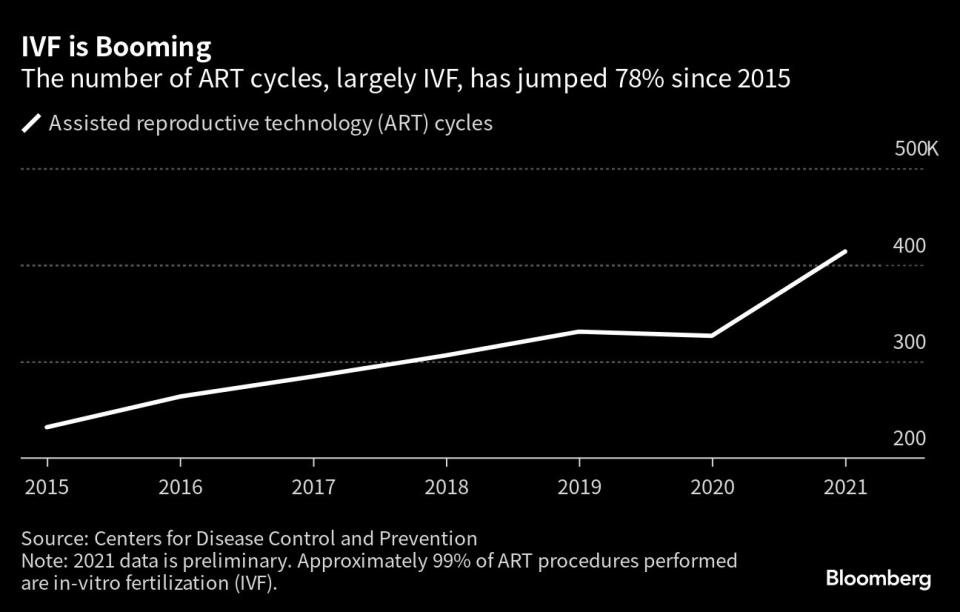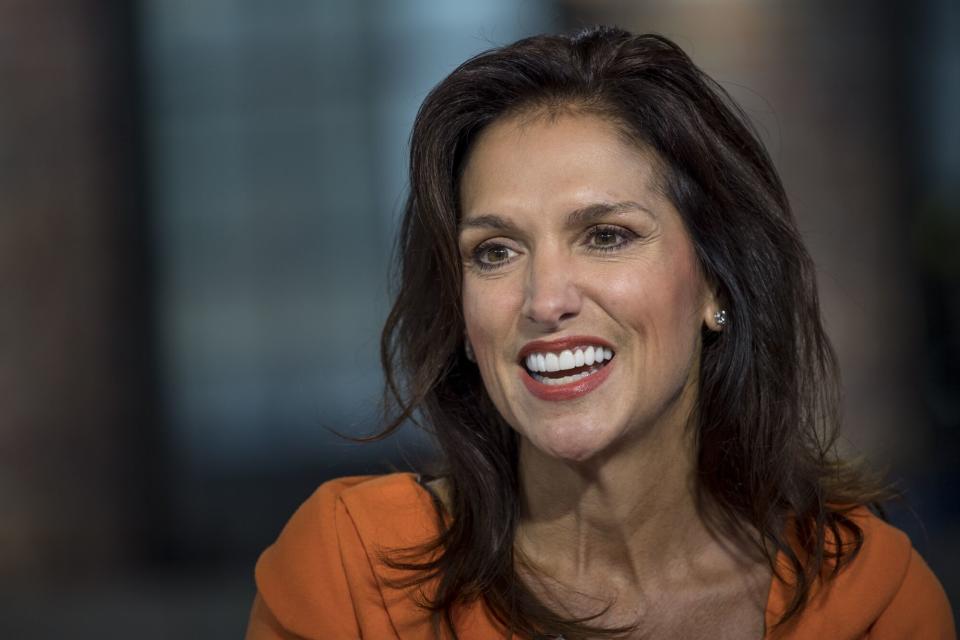Fertility Startup With a ‘Profit Mindset’ Pushes Doctors for More Egg Retrievals
(Bloomberg) -- In September, the fertility startup Kindbody gathered its doctors at a weekend retreat in a Los Angeles hotel. They bonded over morning yoga and swapped best practices for helping women conceive babies.
Most Read from Bloomberg
Harvard’s President Claudine Gay to Resign After Controversy
US Pressured Netherlands to Block China-Bound Chip Machinery
Electric Car Models Eligible for $7,500 Tax Credit Cut to 13
But an announcement by Kindbody executives cast a pall over the event. The company was burning through cash. If it was going to turn a profit and go public, the 32 reproductive endocrinologists would need to raise the number of monthly egg retrieval attempts they perform by 12, according to physicians who received performance plans reviewed by Bloomberg. For some, this meant doubling procedures. At the retreat and in the days following it, several physicians pushed back vocally, according to people familiar with the talks, calling the targets unreasonable and warning they could incentivize physicians to encourage intrusive, expensive treatments to patients who don't necessarily need them. The people familiar asked not to be identified to discuss internal matters.
The week after the retreat, Kindbody presented a plan to its board of directors, including investors from Perceptive Advisors, RRE Ventures and JPMorgan Chase & Co.’s healthcare venture arm. The report ranked all of its doctors only by the average number of egg retrieval attempts they were performing. Those who fell beneath a benchmark average of 23 were labeled as falling “below expectations,” documents reviewed by Bloomberg show. This target would be raised by 43% to 33 per month in a direct bid to bolster finances, the company said in the presentation.
In a statement to Bloomberg, Kindbody said it had set individual targets for doctors at the retreat to help the company reach a goal of getting 4,500 people pregnant. The company disputed that it sets “a blanket target” for retrievals, and said that doctors are assessed by more than just retrieval numbers. They’re also judged on patient satisfaction, feedback and the success of their treatments, Kindbody said in its statement. “Our guiding metric is the patient experience,’’ the company said. A spokesperson did not comment on why doctors were ranked solely based on retrievals in the board presentation.
In-vitro fertilization, which Kindbody offers at its 33 clinics alongside other fertility services such as egg freezing, can cost patients upwards of $13,800, not including medications. Egg retrieval involves an often emotionally and physically taxing regimen of blood tests, ultrasounds and hormone injections, with potential side effects ranging from bloating to internal bleeding. It’s also the most lucrative procedure Kindbody offers, comprising about half of the revenue collected from an IVF cycle, according to current and former Kindbody doctors who spoke on condition of anonymity as the information is not public. Bundled packages are offered for $27,000 and $32,000, which cover two and three retrievals, respectively. IVF treatment in the US is also largely an out-of-pocket expense, with an estimated 56% of patients not covered by insurance, according to the resource and clinic review site FertilityIQ.
Linking revenue to doctors’ productivity highlights an ongoing debate among academics and medical experts over the ethics behind for-profit companies in the business of reproductive health. Kindbody – which has raised more than $300 million from companies including Alphabet Inc. and gained the backing of celebrities such as Gwyneth Paltrow – has directly connected the push for retrievals to its efforts to take the company public, according to six current and former Kindbody doctors, as well as documents reviewed by Bloomberg.
It’s common practice for fertility clinics to measure their success by the number of babies born from IVF treatments. They’re required by law to report live birth rates. And while other fertility services providers track egg retrievals, one Kindbody rival says it doesn't set targets.
Read More: Embryo Errors, Flooded Clinics: Kindbody and IVF’s Risky Business
Kindbody said that the practice of tying monthly egg retrieval targets to doctors’ compensation and revenue forecasts is an industry standard, and it views egg retrievals as “a critical point of success’’ in the company’s efforts to increase access to fertility treatments.
“It is inaccurate and irresponsible to reduce fertility care – a highly technical, specific, and individualized practice – to a single metric or portray it as driven solely by profit,’’ Kindbody said in its statement to Bloomberg. “At Kindbody, patient care and maximizing the chances of patient success are paramount – not profit.”
At the very same time Kindbody was giving its presentation to the board, multiple patients of one of the doctors ranked as falling below expectations received an email saying that the physician would “transition out of” the clinic she directed, according to the time stamps on emails reviewed by Bloomberg. Two other doctors Kindbody listed in the presentation as falling below the target have also since left the company, according to four current employees. The circumstances surrounding their departures are not clear. Kindbody said it hired four new doctors since September.
Perceptive and RRE, which have representatives on Kindbody’s board, didn’t respond to requests for comment on the presentation. Investor JP Morgan declined to comment.
“Having metrics is not a bad thing. The question is what determines those targets?” said Dr. Zev Williams, chief of the division of reproductive endocrinology and infertility at Columbia University Irving Medical Center. “Patient needs, not profit calculations, should always come first,” he said. Families may want to explore less invasive methods of becoming pregnant first, Williams said. Not every fertility patient, he said, is seeking services that require an egg retrieval. Alternatives to IVF include artificial insemination and ovarian stimulation, services that Kindbody also offers.
‘Misaligned Incentives’
The fertility industry has boomed in recent years, propelled by a desire among some people to postpone childbearing and rising rates of infertility among some populations. The number of assisted reproductive technology procedures — mostly IVF — soared by 78% in 2021, according to the Centers for Disease Control and Prevention and the global fertility market is expected to grow into a $84 billion business by 2028, according to market research firm Imarc.
When it was founded in 2018, Kindbody pitched itself as a modern alternative to traditional fertility clinics, with a millennial-friendly aesthetic, a message of female empowerment and a promise to lower costs. The company has rapidly expanded in the past two years, acquiring a competitor, winning corporate benefits contracts with companies including Walmart Inc. and Tesla Inc., and courting investment banks to prepare for a public listing.
That growth has also contributed to larger-than-expected operating losses and a cash burn that the company has described to investors as “material,” Bloomberg previously reported. Increasing egg retrievals is at the center of the startup’s plan to strengthen its finances, according to the September internal presentation.
Read More: Fertility Startup Kindbody Seeks to Raise $50 Million, Cuts Sales Outlook
Unlike other fertility benefits providers that collect a fee for being a middleman between patients and a clinic, Kindbody’s revenue depends in part on the procedures it performs on patients who walk into its brick-and-mortar locations. At least one prospective corporate customer raised concerns about the startup’s business model, according to the internal presentation.
The asset management company Fidelity Investments declined to contract with Kindbody for its employees’ benefits because it was concerned that “misaligned incentives” at Kindbody would drive the company to steer customers toward using its own clinics, the report showed. "We continuously evaluate our benefits offerings and consider a variety of proprietary factors when selecting providers, always keeping our associates’ best interest at the forefront of decisions,” Fidelity said in a statement. Kindbody said that, “like every company, we don’t win 100% of the business we compete for.”
A Bloomberg investigation published Oct. 13 found understaffed clinics and inconsistent safety protocols contributed to errors — including mislabeled, lost or accidentally destroyed embryos — at Kindbody facilities. It was based on interviews with three dozen current and former employees and patients. The company at the time disputed the characterization that it was understaffed or struggled to staff clinics and labs, though it acknowledged the mislabeling of a patient’s embryos in one case.
‘Profit Mindset’
In the September board presentation outlining Kindbody’s finances, the company said its doctors had performed a total of 4,477 retrievals this year through September, at an average price of $8,383 each. In the document, Kindbody emphasized its “profit mindset” and added that a companywide manual which informs all doctors on clinical standard operating procedures, titled “KindWays,” is focused on “process, efficiency, profit.” Kindbody said in a statement that the word “profit” doesn’t appear in its employee manuals. However, the company did not explain why it said in the September board presentation that profit was a focus of the manuals.
In the presentation, Kindbody said it would increase the number of retrievals by turning to gynecologists. These doctors are less expensive to hire than reproductive endocrinologists, who receive more clinical training in fertility treatment, according to data from the Medical Group Management Association.
Earlier this year, Kindbody established an internal program called "KindInstitute” through which a cohort of 12 gynecologists would be trained over six months to perform procedures including retrievals and embryo transfers, four current and two former employees said. Kindbody told some investors that the program is projected to bring in more than $40 million in additional revenue per year, according to documents and current employees familiar with the company’s finances.
In its statement, Kindbody said demand for fertility care has outstripped supply of specialized fertility doctors and that training gynecologists is “a common practice in other developed countries, such as Denmark and Israel who have significantly better access to fertility care.”
Kindbody competitor Pinnacle Fertility is also exploring a way to train gynecologists as a way of dealing with a shortage in specialized fertility doctors. But it hasn’t yet launched an effort as it is still researching best practices for a program, according to chief executive Beth Zoneraich.
It is not unusual for fertility clinics to track the number of retrievals doctors perform, according to Dr. Kate Devine, medical director and chief research officer at Kindbody rival US Fertility. However, Devine said that US Fertility does not impose retrieval targets, monthly or otherwise, for doctors in its network.
“It would be naive to say there isn’t a bottom line,” Devine said, noting that her company tracks revenue per physician, how well physicians get along with colleagues and how they contribute to the field through research. “If physicians are being judged solely on how many retrievals their patients go through, that could create some perverse incentives,” she said.
For its part, Kindbody said its physicians aren’t encouraged to push patients into unnecessary treatments. The company’s doctors, it said, “maintain independent medical judgment and make all treatment recommendations based on scientific evidence and a patient’s individual medical history and needs.’’
Most Read from Bloomberg Businessweek
©2023 Bloomberg L.P.

 Yahoo Finance
Yahoo Finance 

